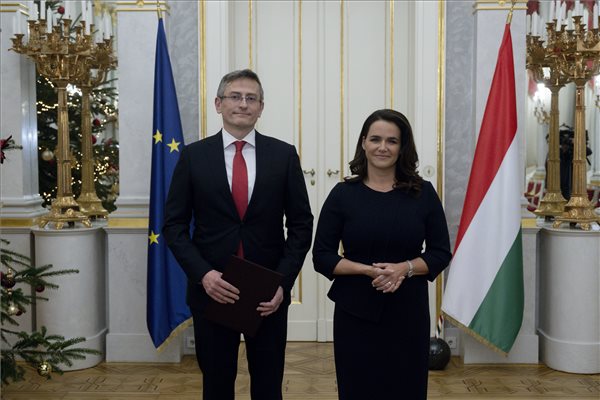
The swearing-in ceremony took place at the Sándor Palace on Tuesday.Continue reading

Adjusting this year’s deficit target to 5.2 percent was inevitable, and it is possible that the budget deficit will end up at around 6 percent of GDP in 2023, Árpád Kovács, the outgoing president of the Fiscal Council told Világgazdaság. Looking ahead to 2024, he said that next year’s GDP growth of 3-3.5 percent, expected to be noticeable for society, will be based on stronger social consumption, a return to productive investment, progress in the adjustment process in energy use, and a favorable growth structure.
Asked how far Hungary’s economy had come in 20 years, he said, “Compared to 20 years ago, when annual social output was around HUF 20 thousand billion (EUR 52.3 billion), this year we can expect three and a half times that amount in current prices, with profound modernization achievements in certain industries and services.” Although 2023 has been a weak year, after a first half with a very high inflationary burden, the second half has already provided the basis for GDP growth next year, he explained.
Overall, he said,
2023 will be remembered as a period of technical recession, but we have preserved the chance of a return to better times from 2024 onwards, with a return to growth that everyone can feel.”
Back in October, the government raised this year’s deficit target by 1.3 percentage points to 5.2 percent from the initial target. “Falling consumption has meant a severe shortfall in tax revenues, and borrowing has led to a sharp increase in debt servicing as inflows of funds from Europe have tightened,” the expert explained
A revision of this year’s deficit target to 5.2 percent was inevitable, and we may end up with an even higher fiscal deficit of around 6 percent of GDP.”

Árpád Kovács receiving the Cross of the Order of Merit of Hungary on December 12. MTI / Koszticsák Szilárd
Asked about the outlook for government debt next year, he said that “the decline in the debt-to-GDP ratio is likely to continue this year and next, albeit perhaps at a slightly more modest pace than in the past.”
He added:
It will be well below 70 percent in 2024.”
On economic growth, he noted that current calculations suggest GDP growth of 3-3.5 percent in 2024. He explained that this is based on a strengthening of social consumption, a return to productive investment, progress in the adjustment process in energy use and a favorable growth structure. He warned, however, that external influences could also affect this figure, with growing uncertainty at global level, such as the war between Russia and Ukraine and the conflict in the Middle East.
Asked how the forint-euro exchange rate could evolve by the end of 2024, he said that although there were economic analysts two years ago who predicted an exchange rate of 400 forints by 2023, “today I consider the value of the exchange rate around HUF 385, the basis of the 2024 budget, to be sustainable.” He believes that “the stabilization of the forint exchange rate is clearly visible, also being reflected in the opinions of credit rating agencies.” Of course, this has also come at a price, as the Fiscal Council met on this issue in the days before Christmas and will continue to do so in the first days of next year.
Via Világgazdaság, Featured image: Pixabay